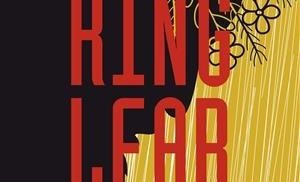Crescent Theatre’s “King Lear” – Review
From the outset, it was apparent that the Crescent Theatre Group’s production of King Lear was going to be a rather different take on Shakespeare’s tragedy. Following the descent into madness of the eponymous King, after being fooled into disowning his youngest daughter and losing his entire estate by the flattery of his two eldest daughters, the play explores themes of loyalty, power and the unfairness of fate. The dialogue was true to the original, but the costumes and sets drew from a number of time periods and genres, making it slightly disorienting and difficult to place initially, which was a little distracting during the opening scenes.
Overall though, the part-military, part-industrial costumes were superb and were used well against a very basic set to illustrate the division of loyalties through the use of spectrum and colour, with Lear’s associates wearing varying quantities of red, Goneril’s sporting purple and Regan’s donning orange. Colour was also cleverly used to emphasise a number of important elements of the play, most notably during the sisters’ declarations of love in the first scene, with only Cordelia being fully draped in the red of her father’s livery, whereas the other sisters wore only red shoes. This was also a delicious nod to various mythology and story theory in which red shoes are symbolic of aspirations of independence and power, usually with some dark consequences; extremely apt, given the progression and outcome of the play.
Warwick Alumni Oliver Davis played a superbly dark, Machiavellian Edmund and was somewhat reminiscent of a brooding Angelus from Joss Whedon’s Buffy The Vampire Slayer in varying outfits of leather and military-style tailoring, amounting to a wardrobe that any Goth would be proud of. Davis’ background in physical theatre was apparent with an extremely energetic, almost acrobatic performance, whilst the lust depicted in his series of affairs throughout the play was thoroughly believable.
The King’s descent into madness was portrayed brilliantly by Alan Marshall. Marshall captured the changing tempo-rhythm of the character wonderfully, dominating the stage as a decadent, playboy King in the opening scenes and convincingly skulking around the edges as a cowering old man towards the end of Act Two.
Peter Smith’s entrance as Poor Tom was also fantastic, although the use of a shopping trolley and painter’s ladder as set and props were somewhat confusing and did not seem to align with the character of the rest of the play. However, as a gibbering, grubby, homeless man, clad only in boxer shorts, Smith easily matched Davis for energy whilst leaping around the stage.
Director Karen Leadbetter pulled no punches with the gruesome portrayal of Gloucester’s torture and subsequent blinding, adding further the gritty, industrial, dark feel of the production.
However, in contrast to the energy, drama and grittiness, the final scene was heart-rending, conveying Lear’s grief and regret perfectly. The audience seemed to be struck into silence by the power of the scene and the final lines rang into the audience for a few seconds before the cast received a very hearty applause.
Overall, the production was energetic, dramatic and for those who enjoy a healthy dose of symbolism, a pleasure to watch with the unspoken allegiances emerging through the use of costume. However despite the engaging staging and lighting, excellent costumes and energetic acting, at a run time of over three hours I was grateful for the strong coffee available at the interval.

Comments